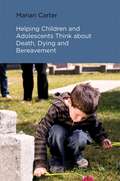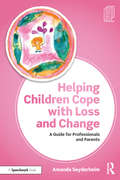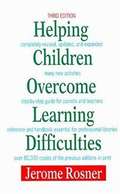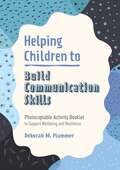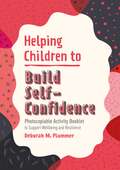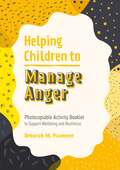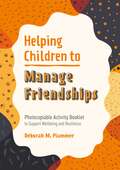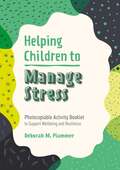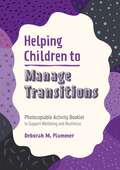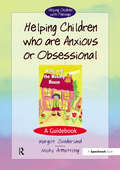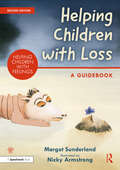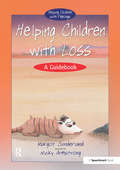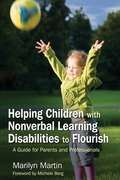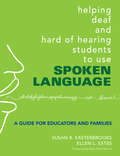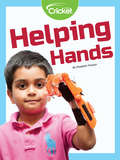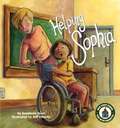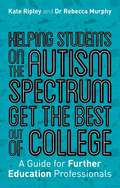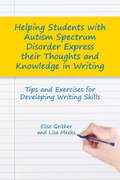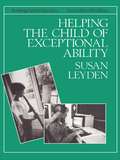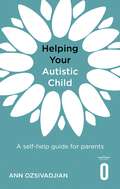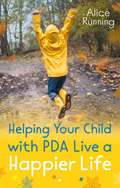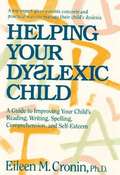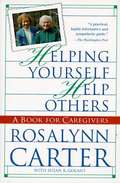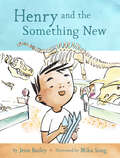- Table View
- List View
Helping Children and Adolescents Think about Death, Dying and Bereavement
by Marian CarterHow can children begin to understand death and cope with bereavement? And how can we, as adults, support and engage with children as they encounter this complex subject? Exploring how children and adolescents can engage with all aspects of death, dying and bereavement, this comprehensive guide looks at how children comprehend the death of a pet or someone close to them, their own dying, bereavement and grieving. It covers how you should discuss death with children, with a particular emphasis on the importance of listening to the child and adapting your approach based on their responses. The book offers guidance on how your own experiences of loss can provide you with models for your interactions with children on the subject of death.
Helping Children Cope with Loss and Change: A Guide for Professionals and Parents
by Amanda SeyderhelmWhether it’s the grief of bereavement, the strain of divorce or the uncertainty of a new home or school, loss and change affect children in countless ways. Nevertheless, teachers and parents frequently find themselves ill-equipped to help children struggling with the difficult feelings that these situations, and others like them, bring. Helping Children Cope with Loss and Change offers guided support for teachers, health professionals and parents. Designed for use with children aged 4-10, this guide offers: Case studies illustrating various signs of grief and loss, to help the caregiver spot and manage a child’s pain. Therapeutic stories designed to be read with the child, and with prompt questions to encourage discussion. Creative activities and exercises that can be developed into a therapeutic ‘toolkit’ to support the child and the caregiver themselves. With chapters that move from Loss and Change to Resolution and Resilience, addressing the needs of both the child and caregiver, Helping Children Cope with Loss and Change will be an invaluable therapeutic tool.
Helping Children Overcome Learning Difficulties (Third Edition)
by Jerome RosnerNew edition of a guide for parents. Explains what to test, why, and what to do with the test results.
Helping Children to Build Communication Skills: Photocopiable Activity Booklet to Support Wellbeing and Resilience (Helping Children to Build Wellbeing and Resilience)
by Deborah PlummerLearning how to communicate effectively and healthily is an important skill for every child to learn. This practical and fun activity booklet facilitates parents, teachers, and therapists to build children's communication skills. It explores how and why we communicate, effective listening, non-verbal communication, and how to stay on topic. Using over thirty years of experience, Deborah Plummer helps children understand that their interactions reflect their beliefs about themselves and others, and shows how to recognise and celebrate the unique and diverse ways in which we express who we are.This book is one of a series based on the use of imagination (I), mindful play (MP) and creative thinking (CT) to enhance social, psychological and emotional wellbeing and resilience in children. The accompanying ebook Using Imagination, Mindful Play and Creative Thinking to Support Wellbeing and Resilience in Children describes the theory and approach behind how these activities can significantly influence children's perceptions of themselves and the world.
Helping Children to Build Self-Confidence: Photocopiable Activity Booklet to Support Wellbeing and Resilience (Helping Children to Build Wellbeing and Resilience)
by Deborah PlummerBuilding self-confidence in children is crucial for healthy psychological, social, and emotional development and wellbeing. This resourceful and fun activity booklet is an invaluable resource for parents, teachers, and therapists in helping to build children's self-confidence. It explores ideas around self-confidence and what that might mean as well as the essentials required to build it. This activity booklet also encourages self-knowledge and self-acceptance through the identification of each child's unique strengths and skills.This book is one of a series based on the use of imagination (I), mindful play (MP) and creative thinking (CT) to enhance social, psychological and emotional wellbeing and resilience in children. The accompanying ebook Using Imagination, Mindful Play and Creative Thinking to Support Wellbeing and Resilience in Children describes the theory and approach behind how these activities can significantly influence children's perceptions of themselves and the world.
Helping Children to Manage Anger: Photocopiable Activity Booklet to Support Wellbeing and Resilience (Helping Children to Build Wellbeing and Resilience)
by Deborah PlummerAnger is a very difficult and often misunderstood emotion for children to experience. Facilitating the healthy management of this natural but challenging emotion is crucial for children's social, psychological, and emotional wellbeing and resilience. Based on over thirty years of expertise, Deborah Plummer provides varied and straightforward activities for teachers, parents, and therapists to healthily engage with children and help them manage anger. This activity book allows space to explore anger and varying degrees of emotion whilst also providing help on how to manage it, allowing children to have better and healthier emotional self-awareness.This book is one of a series based on the use of imagination (I), mindful play (MP) and creative thinking (CT) to enhance social, psychological and emotional wellbeing and resilience in children. The accompanying ebook Using Imagination, Mindful Play and Creative Thinking to Support Wellbeing and Resilience in Children describes the theory and approach behind how these activities can significantly influence children's perceptions of themselves and the world.
Helping Children to Manage Friendships: Photocopiable Activity Booklet to Support Wellbeing and Resilience (Helping Children to Build Wellbeing and Resilience)
by Deborah PlummerFriendships and community are very important for the healthy social, psychological, and emotional development of young children. In this fun and accessible activity book, Deborah Plummer deploys over thirty years of expertise for parents, teachers, and therapists to facilitate healthy friendships between children. This activity book explores concepts around child friendships, community, and being part of a group whilst also including sections on cooperation, negotiation, and conflict resolution.This book is one of a series based on the use of imagination (I), mindful play (MP) and creative thinking (CT) to enhance social, psychological and emotional wellbeing and resilience in children. The accompanying ebook Using Imagination, Mindful Play and Creative Thinking to Support Wellbeing and Resilience in Children describes the theory and approach behind how these activities can significantly influence children's perceptions of themselves and the world.
Helping Children to Manage Stress: Photocopiable Activity Booklet to Support Wellbeing and Resilience (Helping Children to Build Wellbeing and Resilience)
by Deborah PlummerFacilitating the healthy management of stress is crucial for the social, psychological, and emotional wellbeing and resilience in children. Based on over thirty years of expertise, Deborah Plummer provides varied and straightforward activities for teachers, parents, and therapists to healthily engage with children and help them manage stress. This activity book allows space to explore stress and help children identify some of their worries, whilst also providing help on how to build skills and strategies that will help them recognise normal signs of stress and how to respond to these appropriately. It also explores the potential benefits and enjoyments of positive stress, allowing children to have a healthy relationship with difficult feelings.This book is one of a series based on the use of imagination (I), mindful play (MP) and creative thinking (CT) to enhance social, psychological and emotional wellbeing and resilience in children. The accompanying ebook Using Imagination, Mindful Play and Creative Thinking to Support Wellbeing and Resilience in Children describes the theory and approach behind how these activities can significantly influence children's perceptions of themselves and the world.
Helping Children to Manage Transitions: Photocopiable Activity Booklet to Support Wellbeing and Resilience (Helping Children to Build Wellbeing and Resilience)
by Deborah PlummerChange and transitions are inevitable but can be an overwhelming and intimidating time for children. Facilitating the healthy management of transitions is crucial for the social, psychological, and emotional wellbeing and resilience in children. Based on over thirty years of expertise experience, Deborah Plummer provides varied and straightforward activities for teachers, parents, and therapists to healthily engage with children and help them process and manage transitions. This activity book aids children in identifying their worries and fears about transitions and facilitates them in building skills and strategies that help them to cope during times of change. It also encourages children to explore the potential benefits and enjoyment that can sometimes be a result of change.This book is one of a series based on the use of imagination (I), mindful play (MP) and creative thinking (CT) to enhance social, psychological and emotional wellbeing and resilience in children. The accompanying ebook Using Imagination, Mindful Play and Creative Thinking to Support Wellbeing and Resilience in Children describes the theory and approach behind how these activities can significantly influence children's perceptions of themselves and the world.
Helping Children Who are Anxious or Obsessional: A Guidebook (Helping Children with Feelings)
by Margot SunderlandThis is a guidebook to help children who: are insecure or worry too much; suffer from phobias or nightmares; find it difficult to concentrate to let go and have fun; have suffered a trauma; are worryingly good or seem like little adults; use order and routine as a way of coping with 'messy' feelings; retreat into dullness as a way of managing their being in the world; and, develop obsessive-compulsive behaviour in order to ward off their too-powerful feelings.
Helping Children with Loss: A Guidebook (Helping Children with Feelings)
by Margot Sunderland Nicky ArmstrongNow in a fully updated second edition, this professional guidebook has been created to help adults provide emotional support for children who have experienced the loss of somebody they know, or something they loved. Written in an accessible style and with a sensitive tone, Helping Children with Loss provides adults with a rich vocabulary for mental states and painful emotions, paving the way for meaningful and healing conversations with children who are struggling with difficult feelings. Practical activities provide opportunities for conversation and will empower the child to find creative and imaginative ways of expressing themselves when words fail. Key features of this resource include: Targeted advice for children who defend against feeling their painful feelings by dissociating from grief Tools and strategies for helping children cope with loss, including engaging activities to help children explore their feelings in a non-threatening way Photocopiable and downloadable resources to help facilitate support Written by a leading child psychotherapist with over thirty years’ experience, this book will support children to develop emotional literacy and connect with unresolved feelings affecting their behaviour. It is an essential resource for anybody supporting children aged 4-12 who have experienced loss.
Helping Children with Loss: A Guidebook (Helping Children with Feelings)
by Margot Sunderland Nicky HancockThis is a guidebook to help children who: are suffering from the pain of loss or separation from someone or something they love deeply; have had a parent, relative or important friend leave or die; are obsessed with their absent parent; have lost someone they love, but have never really mourned; are trying to manage all their painful feelings of loss by themselves; feel that they have lost the love of someone they love deeply; are suffering from separation anxiety; and are adopted or fostered children who miss their birth parent terribly. Helping Children with Loss Using this engaging story and practical guidebook you can help children suffering from the pain of loss or separation. They may be: grieving for the death of a parent, relative or important friend; obsessed with an absent parent; struggling to mourn a loss; trying to manage all of their painful feelings by themselves; suffering from separation anxiety; and adopted or fostered children who miss their birth parent.
Helping Children with Nonverbal Learning Disabilities to Flourish: A Guide for Parents and Professionals
by Marilyn Martin Zion`Imagine getting lost in your own home, forgetting where the bathroom is at work, or being unable to operate a simple door knob. These are just some of the myriad challenges faced by individuals with a Nonverbal Learning Disability, or NLD...In Helping Children With Non-Verbal Learning Disabilities to Flourish, Marilyn Martin gives an overview of NLD and strategies for teaching individuals with this disability. Using examples of her struggles to help her daughter, who has NLD, as well as current research, she has written a book helpful for both parents and professionals. In addition to her experiences with her daughter, Martin is a Learning Specialist with more than fifteen years of experience working with students who have dyslexia, NLD, and other learning disorders... This book is a good introduction to NLD and interventions for treating it... As it gains recognition as a distinct learning disorder, interventions and informative books, like this one, will open doors, literally and figuratively, for families and individuals touched by NLD.' - Foreword, Autumn 2007 `Author Marilyn Martin's daughter Sara was diagnosed with Nonverbal Learning Disability (NLD). Marilyn offers a comprehensive developmental profile of children with NLD and explores the controversies surrounding the condition so parents and professionals can identify learners with NLD and ensure they receive early intervention. Offering practical advice on NLD at home and at school, the book describes step by step interventions for improving a range of skills from penmanship to social acumen.' -Autism Us, 2007 `Marilyn Martin's book Helping Children with Nonverbal Learning Disorder to Flourish is an exciting and essential new addition to the literature. ... Martin shines in her ability to match interventions to a broad range of problems and examples abound in every chapter. Clear, concise, and detailed explanations are given so that the interventions can be applied skillfully. ... Each intervention is presented in a terrifically useful and usable format that includes the problem, strengths available, proposed solution, how the solution can be generalized, the goal of the intervention, and a very up-to-date and helpful listing of relevant resources.' - from the Foreword by Michele Berg, Director, Center for Learning Disorders, Family Service and Guidance When you continuously cannot find the bathroom in your best friend's house, or you cannot print the letter `t' when all your friends are writing volumes, you notice, and you ask questions. So it was for Marilyn Martin's daughter, Sara, who was diagnosed with Nonverbal Learning Disability (NLD). This book skilfully combines a comprehensive guide to NLD with the inspiring story of how Sara transformed herself from that young girl whose existence seemed darkened by learning difficulties into the capable young woman she is today. In Helping Children with Nonverbal Learning Disabilities to Flourish, Marilyn Martin presents a comprehensive developmental profile of children with NLD. She explores the controversies surrounding the disorder so parents and professionals can identify learners with NLD and insure they receive early intervention. Offering practical advice on NLD at home and at school, she describes step-by-step interventions for improving a range of skills from penmanship to social acumen. This book is essential reading for parents and professionals working with children with NLD.
Helping Deaf and Hard of Hearing Students to Use Spoken Language: A Guide for Educators and Families
by Susan Easterbrooks Ellen L. EstesBased on the authors' model of auditory, speech, and language development, the book provides educators with effective techniques and strategies for working with children in the primary grades.
Helping Hands
by Elizabeth PrestonSome kids are born missing a hand or fingers, others lose them because of accidents. Find out how people are printing artificial hands on 3-D printers to help those who need a hand. They are cheap, easy to build, and really work!
Helping Sophia
by Anastasia SuenThe students in Miss K's class experience situations that occur in schools everywhere. When Sophia's helper is absent, her fellow third-graders help out by learning how to push her wheelchair. Sophia's story teaches about caring, kindness, and children with disabilities with brilliant illustrations and humorous text. What Do You Think? quetions, Miss K's Classroom rules, and a glossary aid teachers in classroom discussions about the character trait of caring featured in this stunning picture book. Special thanks to content consultant Vicki F. Panaccione Ph. D.
Helping Students on the Autism Spectrum Get the Best Out of College: A Guide for Further Education Professionals
by Kate Ripley Rebecca MurphyThis is the companion guide for further education staff working with students on the autism spectrum who are using Getting the Best Out of College for Students on the Autism Spectrum: A Workbook for Entering Further Education.The workbook takes a holistic approach and focusses on the practicalities of college life for autistic students transitioning to further education, as well as those already there. It covers everything needed to support autistic students including getting to college, how to handle new sensory issues, peer relationships, where to go for help, time management, and exam anxiety.This guide follows the structure of the workbook Getting the Best Out of College for Students on the Autism Spectrum. For each chapter, there is a parallel chapter in the student guide that directly addresses the students' needs. This guide includes case studies, contextual information and frameworks to help adults work through the exercises and interactive elements with the student.
Helping Students with Autism Spectrum Disorder Express their Thoughts and Knowledge in Writing: Tips and Exercises for Developing Writing Skills
by Lisa M. Meeks Elise GeitherWhen it comes to academic work, students with Autism Spectrum Disorder (ASD) often have the required knowledge but struggle to get their thoughts down in writing. This is a practical guide to teaching and improving writing skills in students with ASD to meet academic writing standards and prepare for the increased expectations of higher education. The book covers key considerations for all educators teaching writing skills to high school and college students with ASD including how to address difficulties with comprehension, executive functioning, and motor skills, how to structure ideas into a coherent argument, and how to develop creativity and expression in writing, as well as how to successfully adapt these skills to meet university expectations. Each chapter includes teaching tips, insightful student perspectives, and ready-to-use writing exercises.
Helping the Child with Exceptional Ability (Special Education Ser.)
by Susan LeydenFirst Published in 1985. Routledge is an imprint of Taylor & Francis, an informa company.
Helping Your Autistic Child: A self-help guide for parents (Helping Your Child)
by Ann OzsivadjianPractical, evidence-based advice for managing distressed behaviours and common situations involving autistic children. Autism affects about one per cent of the population, and whilst it can present very differently among individuals, there are some common challenges faced by autistic people. This self-help guide focuses on practical, proven techniques to help parents support their autistic children with commonly experienced areas of difficulty. Written by authors with extensive experience in research and in working clinically with children with a wide range of neurodevelopmental differences, this book uses a strengths-based approach to guide parents in helping their children to enhance their skills, as well as to manage some common challenges.This book will help you to: · Support your child through anxiety and social interaction issues · Manage sleep problems and feeding difficulties · Understand sensory responses in autism · Understand and manage distressed behaviour, including self-harm and demand avoidanceHelping Your Child is a series for parents and caregivers to support children through developmental difficulties, both psychological and physical. Each guide uses clinically proven techniques. Series editors: Dr Polly Waite and Emeritus Professor Peter Cooper
Helping Your Autistic Child: A self-help guide for parents (Helping Your Child)
by Ann OzsivadjianPractical, evidence-based advice for managing distressed behaviours and common situations involving autistic children. Autism affects about one per cent of the population, and whilst it can present very differently among individuals, there are some common challenges faced by autistic people. This self-help guide focuses on practical, proven techniques to help parents support their autistic children with commonly experienced areas of difficulty. Written by authors with extensive experience in research and in working clinically with children with a wide range of neurodevelopmental differences, this book uses a strengths-based approach to guide parents in helping their children to enhance their skills, as well as to manage some common challenges.This book will help you to: · Support your child through anxiety and social interaction issues · Manage sleep problems and feeding difficulties · Understand sensory responses in autism · Understand and manage distressed behaviour, including self-harm and demand avoidanceHelping Your Child is a series for parents and caregivers to support children through developmental difficulties, both psychological and physical. Each guide uses clinically proven techniques. Series editors: Dr Polly Waite and Emeritus Professor Peter Cooper
Helping Your Child with PDA Live a Happier Life
by Alice RunningDrawing on the author's personal experience of parenting a child with PDA, this insightful and informative guide offers strategies and tips for all aspects of daily life, including sensory issues, education and negotiation.Full of advice and support, this book is not intended to provide information on how to change your children. Rather, it is focused on creating the type of environment that will allow children to be authentically themselves, thereby enabling them to flourish and thrive.
Helping Your Dyslexic Child: A Guide to Improving Your Child's Reading, Writing, Spelling, Comprehension, and Self-Esteem
by Eileen CroninCronin gives parents very clear descriptions of the behaviors which generally accompany the different presentations of dyslexia. Then, she outlines straightforward steps for capitalizing on the child's abilities A sensible and informative approach to coping with this set of learning challenges..
Helping Yourself Help Others: A Book for Caregivers
by Rosalynn Carter Susan K. GolantHaving cared at home for her ailing father and grandfather, Rosalynn Carter's involvement has taught her that Americans are in the middle of a caregiving crisis. In this book, Mrs. Carter addresses the social issues that have created this crisis and offers practical solutions to the problems caregivers typically experience, such as isolation, burnout, anger, and helplessness.
Henry and the Something New: Book 2
by Jenn Bailey"Relatable characters, familiar scenarios, and gentle humor make this a remarkably satisfying read." —Horn Book Magazine, Starred Review From the creators of the Schneider Award-winning books A Friend for Henry and Henry, Like Always comes a delightful beginning chapter book about embracing new experiences, starring a sweet and sensitive child on the autism spectrum.It’s Field Trip Day! Henry's class is excited to visit the museum, but Henry is not so sure. The museum means maybe seeing dinosaurs, Henry's favorite. But it also means a lot of things that are new: a noisy school bus ride, a building full of echoes and hallways, and plenty of chances to get lost! Will he find something that makes all of this new worth the trip? Come along with Henry in this funny, bighearted tale about trying new things, exploring new places, and finding the courage to make yourself heard.JUST RIGHT FOR BEGINNING READERS: With short chapters and simple text, this book is perfect for newly independent readers who are just moving on to longer books.FIRST FIELD TRIP: This story will encourage and reassure any child beginning school or preparing to embark on their first field trip as Henry navigates the excitement (and potential anxiety) that comes with doing new things for the first time.GREAT BACK-TO-SCHOOL READ: Perfect for any reader starting a new school year, the Henry series explores common school experiences in a gentle, funny, and encouraging way. DIVERSE STORIES: Centering neurodivergent kids is vital to expanding diverse representation across books for all ages. The Henry series provides a mirror and a window for kids on the autism spectrum and their friends to see themselves in the stories they read.AN AWARD-WINNING TEAM: Jenn Bailey and Mika Song received a Schneider Family Book Honor Award for their picture book A Friend for Henry. See how the story continues in this classic-feeling early reader series based on the same character!Perfect for:Newly independent readersAn excellent resource for parents of kids on the spectrumLibrarians, teachers, and booksellers looking for a children’s book that offers a window into the experience of autismA reassuring read for kids with varying levels of social anxietyGift givers looking for a sweet and relatable book about trying new things
